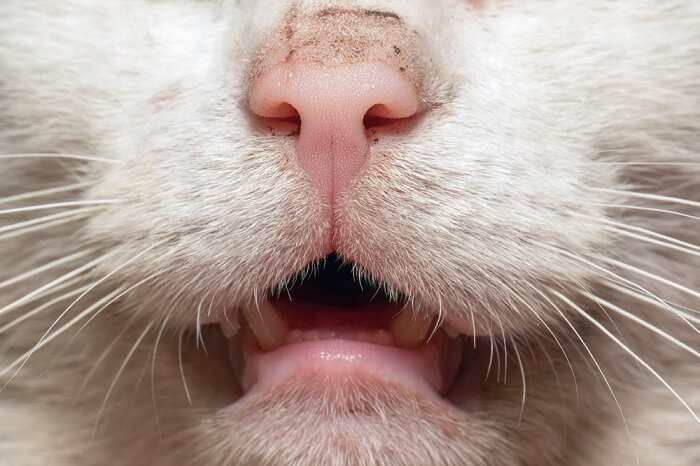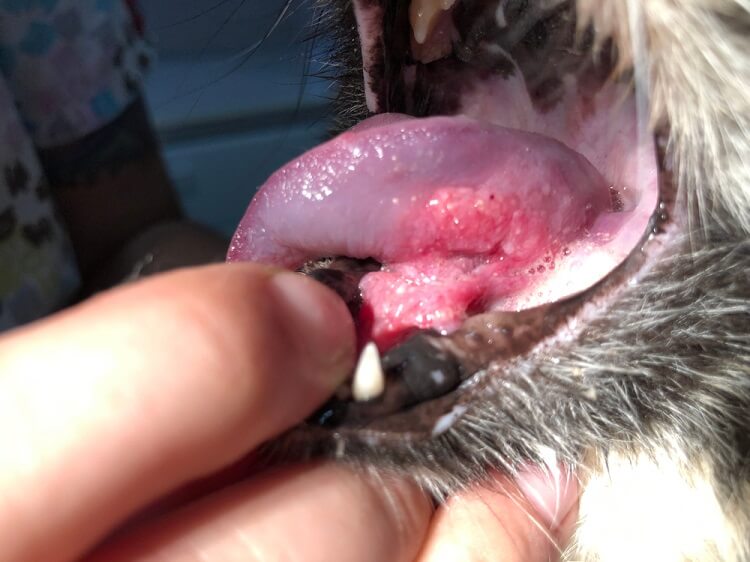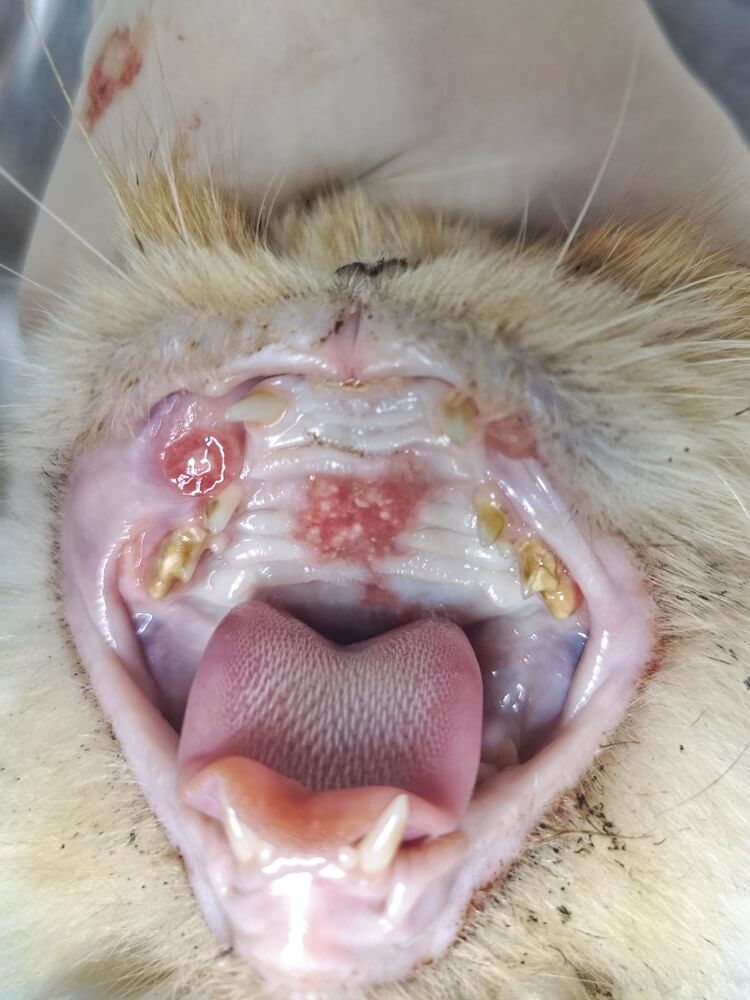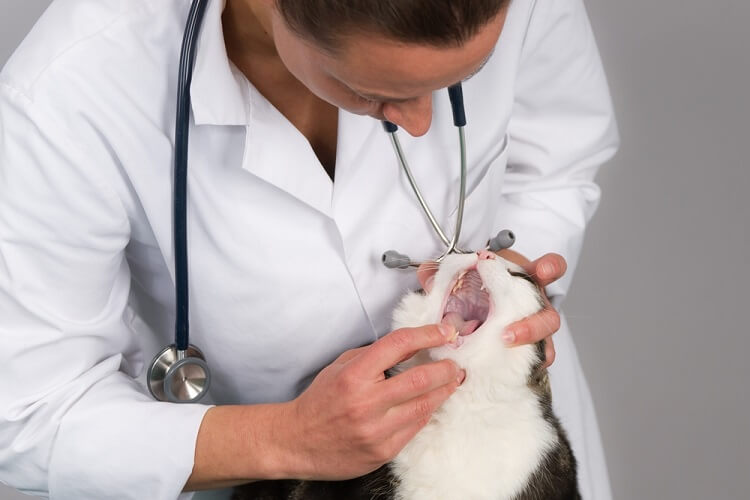
If your cat suddenly begins refusing food and acting uncomfortable around the mouth, there can be several possible causes for this change. In most cases, these signs are caused by treatable dental disease.
In some cases, however, oral pain and reluctance to eat can be caused by an oral tumor. Finding, diagnosing, and treating oral tumors will require partnering with your cat’s veterinarian.
Quick Overview: Mouth Cancer in Cats







What Is Mouth Cancer in Cats (Feline Oral Squamous Cell Carcinoma)?
Oral cancer accounts for approximately 10% of feline cancer cases and is the third most common site of cancer in cats. Oral cancer leads to the formation of harmful swellings or other lesions within the oral cavity, along the gums, palate (roof the mouth), or within the throat. Squamous cell carcinoma is the most common oral cancer in cats.
Causes of Mouth Cancer in Cats

The most common type of oral cancer is squamous cell carcinoma. These represent about 70% of oral tumors in cats.
There are several different types of tumors that can develop in the mouth of a cat. Not all of these tumors are cancerous. Oral masses in cats may be caused by inflammation, infection, or even trauma.
The most common oral cancer in the cat, by far, is squamous cell carcinoma. Approximately 70% of oral tumors in cats are squamous cell carcinomas.
These tumors grow from the lining of the oral cavity, including the gums, tongue, palate, and tonsils. Squamous cell carcinomas are a significant medical problem, because they tend to be locally invasive. Although they rarely metastasize (spread distantly), they often invade the underlying law bones (mandible and maxilla), making complete removal difficult.
Other common causes of oral tumors in cats are fibrosarcomas, osteosarcomas, and odontogenic tumors. Fibrosarcomas arise from the connective tissues within the mouth, often from the jaw bones. Osteosarcomas arise solely from bony tissues, such as the jaw bones. Odontogenic tumors arise from the tissues making up the teeth.
No one knows why some cats develop oral tumors. It is suspected that environmental contaminants, such as cigarette smoke and chemicals found in flea collars, may play a role; however, this has not been proven.
Symptoms of Mouth Cancer

While some mouth cancers are visible, other symptoms can indicate mouth cancer, including bad breath and difficulty eating.
Oral tumors are painful, especially during eating. The first sign of an oral tumor is often a reluctance to eat, accompanied by weight loss. Some cats may act painful when chewing, but in many cases, owners attribute the decrease in appetite to nausea, a need to change the food, or other factors. Cats don’t always show the obvious signs of pain that you would expect, such as pawing at their mouth or acting uncomfortable.
In many cases, growing oral tumors begin to bleed. You may notice that your cat is drooling thick, ropey, blood-tinged saliva. You may also notice small drops of blood saliva around your cat’s food and water bowl, on your cat’s bed, or in other places your cat likes to rest. Your cat may have blood on his or her front paws, from attempting to groom away the bloody saliva from the mouth.
As oral tumors continue to grow, you may notice that your cat has bad breath or halitosis. Your cat’s body may also begin to smell unpleasant, as the saliva is spread across the body with grooming.
It’s important to note that all of these symptoms can also be associated with dental disease. Gum inflammation and dental infections can also lead to difficulty eating, oral bleeding, and foul breath. The only way to distinguish dental disease from an oral tumor is a thorough veterinary workup.
Diagnosis of Mouth Cancer in Cats
Oral tumors can be found in one of two ways. Tumors are often found early, during routine veterinary care. This is the ideal scenario because is more effective when tumors are small. In other cases, however, oral tumors are not detected until the mass is causing significant clinical signs and negatively affecting the cat’s quality of life.
The first step in diagnosing an oral tumor is a thorough physical examination, including an oral exam.
Your veterinarian may be able to get a brief look in the mouth while your cat is awake, but a thorough examination requires sedation or general anesthesia.
In most cases, your veterinarian will recommend general anesthesia, because this will not only allow an examination of the mouth, but also allow your veterinarian to address issues that may be found during that examination (whether they are masses or diseased teeth that require extraction).
Before anesthesia, your veterinarian will perform pre-anesthetic bloodwork. This bloodwork allows your veterinarian to look for underlying diseases that might affect your cat’s anesthesia.
Based on the results of the bloodwork, your veterinarian will develop a detailed treatment plan for your cat. Your cat will receive a combination of injectable anesthetic drugs and inhalant anesthetics, delivered via a breathing tube.
Once your cat is anesthetized, your veterinarian can perform a thorough oral exam, looking for oral tumors or any other abnormalities.
Any time a mass is found in the mouth, even if it is found during a routine dental cleaning, the mass should be biopsied. If the mass is small, excision can be performed at the time of biopsy. If the tumor size is larger, however, oral masses often cannot be completely removed in a single surgery.
Instead, your veterinarian will remove just a small section of the mass for the pathologist to examine and then plan further treatment based on the results of this biopsy.
Biopsy results are typically available approximately one week after surgery.
Your veterinarian will call you with these results and discuss further recommended treatments.
If your cat is diagnosed with an oral squamous cell carcinoma, next steps might include tests to look for metastasis, such as performing fine needle aspirates of your cat’s lymph nodes, radiographs (x-rays), and computed tomography (a CT scan) to assess the bony involvement of your cat’s mass.
Depending on the results of these staging tests, your veterinarian will likely refer you to the oncology department of your local veterinary referral hospital.
Mouth Cancer Treatment and Prognosis

The prognosis for a cat with mouth cancer depends on the type of tumor involved and how advanced it is at the time of diagnosis.
The treatment and prognosis of oral cancer in cats is dependent on two factors: the type of tumor involved and how advanced the tumor is at the time of diagnosis.
Oral squamous cell carcinoma generally is associated with a poor prognosis, regardless of treatment. According to North Carolina State University, cats with oral squamous cell carcinoma survive an average of two to four months with treatments such as surgical removal, radiation therapy, and chemotherapy.
Less than 10% of cats with oral squamous cell carcinoma survive to one year. In general, cats in which the tumor is diagnosed and treated earlier are expected to have better outcomes than cats whose cancer is diagnosed at a later stage.
Other oral tumors, such as fibrosarcoma, osteosarcoma, and odontogenic tumors, are associated with longer anticipated survival times than squamous cell carcinoma. The first step in treating these tumors is typically surgery, which may be followed by radiation and/or chemotherapy.
In some cases, palliative radiation may be used to keep a cat comfortable and extend his or her lifespan, even if the cancer cannot be cured.
Conclusion
If your cat is showing signs of an oral tumor, prompt diagnosis and treatment is essential. While the prognosis for squamous cell carcinoma is not good, other oral tumors can exist and earlier diagnosis will mean that you have a greater likelihood of successful treatment.
Frequently Asked Questions
How long does a cat live with mouth cancer?
There are several different types of oral cancer, each of which has a different prognosis. The most common type of oral cancer in cats, squamous cell carcinoma, has a median survival time of two to four mons with treatment.
What does cancer in a cat's mouth look like?
The appearance of feline oral cancer can vary significantly, depending on the type of cancer and how far advanced the cancer is. In most cases, oral cancer will be visible as a swelling on the gums, law, palate (roof of the mouth), or in the tonsils.
How common is mouth cancer in cats?
Oral tumors are relatively common in cats. While not all oral tumors are cancerous, approximately 10% of feline cancer cases occur as an oral cancer.
What causes oral cancer in cats?
No one has definitively determined the cause of oral cancer in cats. It is suspected that environmental contaminants may play a role, especially given the frequency with which cats lick their coats, but this has not been proven.








I find the picture of the cat during surgery, with it’s mouth held open with a metal spring/screw quite horrific. It’s well known that holding a cat’s jaw open as wide as this…in fact any more than 2cm is dangerous as can cut the flow of blood to eyes and brain! It can cause blindness in cats.
There are many studies about this and recommendations to vets.
Please remove this picture as may give impression that usng such instruments is ok.
Thanks
Hi Lesley, thank you for commenting! We have decided to remove the image shown in the article. To clarify, it is not recommended that a mouth gag be used for a long period of time. Since the cat in the image is not intubated, the mouth gag was likely only placed there for a quick minute under light sedation or, sadly, the cat may have already been euthanized when the photo was taken. Again, we have chosen to remove the image. Thank you for your input.
I wanted to say Thank you for the article. My cat who is over 18 was diagnosed yesterday with mouth cancer and I took her home. After listening to the dr. and reading this it is time to bring her in. It will kill me inside but it is better than watching her suffer. This came on suddenly so anyone who see the drooling that’s the sign. I wish I knew its been a few weeks with that I thought it was a tooth then said it must be an infection so I brought her in and the dr said her tong is being pushed as it is a fast growing tumor.
Hi. we have 7 cats, having lost one the other week however, he was poisoned when about 1 year and the vet reckoned he would only survive for about 2 years, he died in my wife’s arms aged 12! We have another, 14 and she has some moth ulcers, I am hoping that it is not serious eg cancer. She is part of our family and is my little girl, having lost 1 this year, and having this one pull a muscle in her leg we really would like her to be OK. She is on Anti biotic and drugs to remove the problems with the chewing so we hope that that is the curative as they do get mouth problems. So I am praying.
Hi Roger, it’s wonderful to hear about your cat who outlived the vet’s predictions, and I also hope that all is well with your 14-year-old. Take care.
My 18 year old cat died this week and my vet said it was most likely oral cancer. About a month ago I spotted heavy drooling and he was clearly unwell, he had had bad breath for a while too. Took him to an emergency clinic but it was my vet who saw the issue and told me that it was either an infection or cancer. When the nasty sore on the roof of his mouth didn’t get better after a full course of antibiotics they said that confirmed cancer. It was heartbreaking but when they told me the surgical options I knew I couldn’t put him through that so chose to keep him comfortable as long as possible.
Thanks for sharing your experience, Susan. I’m sorry to hear you went through this, and I wish you all the best.
When a cat has mouth cancer and has a loose jaw and bone loss, what would be he best thing for her? As far as she wont suffer. Is surgery best or is putting them to sleep the best thing to do. My cat is named baby briana n she was born and abandoned by its mother with less then 2 weeks old. N it’s now 17 years old n for years she has lived with a heart murmur. What is best thing for her right now.??
I would advise talking to your veterinarian about the best course of action to help her. Wishing you all the best.
Are there options to help a kitty with SCC who clearly dislikes the smell/taste she’s experiencing? We know she doesn’t have much longer and she’s essentially in hospice care now. She’s eating and drinking well so we want to keep her comfortable, but at times she really seems to dislike the foul taste. Any suggestions? Thanks!
Hi Tiffany, that’s a fantastic question. Unfortunately, I can’t help you out due to a lack of veterinary experience (plus I couldn’t find any information on this specific issue online), but you can get some insights from the vet moderators in the All About Cats community. Would love to see your question posted there—it’s an important one. Also, our community is currently pretty small, so you might be able to get some more information from other cat owners on TheCatSite forums. They don’t have vet moderators, but it’s a huge forum with lots of very experienced, helpful people.
– Mallory
Can a cat have oral cancer even if there are no lesions present? My 9-year-old cat is having difficulty eating (she wants to eat but she chews on one side of her mouth and doesn’t always finish all of her food). She had a dental exam and cleaning under anesthesia and the vet said her mouth and teeth looked great. The eating difficulty is persisting even after her dental a month ago. Could she still have cancer anyway? Thanks!
Hi Mia, that’s an excellent question. I’m not a vet, but there are a few things that come to mind—I wonder if your cat may have resorptive lesions, which are not always visible without an x-ray (not sure if this was done during your cat’s exam), and which can cause pain as they progress. Oral cancer is also a possibility, as there could be a tumor not visible during the basic dental exam. I would get a second opinion from another vet if possible, as it definitely sounds like something is going on in your cat’s mouth. Fingers crossed that it’s something easily-treatable. – Mallory
hi. my cat is 18, and has a tumor embedded in her jaw and cheek bone. It’s very sad to see her go through this, but my 12 year old suffered before she died, and I don’t want my 18 year old to suffer. I am thinking of putting her down tomorrow, but i’m scared to. any suggestions? thanks
Hello Anthony, I’m so sorry about the late response. I hope you’re doing well. If you haven’t already put your cat down, you might appreciate this article on knowing when it’s the right time to euthanize a cat.
My 12 year old cat has a lump inside her lip on the left side of her mouth (a growth under the skin). She is not having any visible troubles and will let me touch it. I was still worried, so I took her to the vet. She told me they can do surgery to remove the growth and send it out to see if it is cancer. They gave me a quote and my husband was not excited about spending the money on a cat we have had for less than a year (got her when my Dad passed away -she was his companion). I have made the appointment to have the growth removed as I do not want it to grow, impede her eating or worse, rupture. Surgery in next month and I have yet to tell my husband that I have scheduled it. She is such a loving, active cat. Am I doing the right thing? How do I tell my husband?
Hey Becky, you seem like a very sweet, thoughtful person. I hope you and your cat are doing well. So, it wouldn’t hurt to be 100% sure of what’s going on in your cat’s mouth, and I wouldn’t discourage you from getting the tumor biopsied. You can’t change what’s already happened, but my recommendation would have been to invest in pet insurance before getting the lump looked at, because if it does turn out to be cancer, that appointment will likely be counted as the first treatment for that condition, and it will be considered a pre-existing condition. Insurance tends to help a lot with issues like this that tend to add up a lot over time. At this point, if this is cancer, the veterinary expenses could get quite high if you do pursue treatment, and then you and your husband will likely end up in another disagreement. So for now, my recommendation would be to tell your husband as soon as possible, because honesty is important, and discuss how you’ll pay for it and what you’ll do if it turns out to be something more costly. Fortunately, there’s a good chance that it’s not cancerous, and you will very likely not have to deal with any of this, and your cat will be happier and healthier, too. Wishing you all the best!
Please br alert to any changed that your cat exhibits. My beautiful calico cat was scratching at something on her face and ears for one year which finally improved when treating her with a product for mites. I am wondrring if this situation caused a drop in hrr immune system that lead to an inoperable jaw tumor. I did take her to a vet when the lesions first appeared on her face and ears but no diagnosis was made. Months later she started avoiding hard food, then eating less of the wet food. At 12 yrs I thought maybe she was just getting older and finicky. I then noticed something on her outer lip which led to the diagnosis by the vet of the inoperable jaw tumor. I had her put down 2 weeks later and still feel guilty for not being more attentive to the early signs that something was wrong. Can external parasites like mites (not ear mites) cause a cat’s immune system to suffer which can lead to things like cancerous tumors? She was an indoor cat that got outside for a few minutes on occasion to eat grass.
Hello Alta, that’s a very thoughtful question. While I don’t know of any confirmed link between tumor development and mites, there are some studies that suggest that there may be a link between cancer and tumor development and mite infestation. For example, this study found that people with cancer (especially breast cancer) were more likely to have mite infestations. Another limited study found that foxes with ear mites had increased levels of inflammation and cell growth, which researchers hypothesized may lead to increased rates of tumor development. Treating the ear mites helped to treat the tumors, too. So there is some indication that there may be a connection, but we don’t know enough to give a definitive answer.
Thank you so much….it kind of makes sense that there could be a connection between. parasites of any kind if it is causing stress for the animal with resulting immune lowering. I’m not a medical scientist, but who knows…this may be proven one day.
I have a male cat and he has cancer in his jaw and he is 12 years old w his name is shadow I had him for 8 years and I am going to have him put to sleep and I am very depressed about it and I am going to miss him when they put him down what can I do when I lose my cat?
Awww, I’m really sorry you’re facing this. 🙁 There’s no single method to dealing with grief, as far as I know, but remembering the good times, sharing your grief with others who understand, finding other sources of joy, and perhaps some journaling, meditation, or prayer can help. Wishing you all the best.
My Dad was just diagnosed with squamous cell carcinoma oral cancer & I am so devestated. I just lost my beloved 21 yro cat Opal to this horrific fn disease (excuse my french) & googling it, I saw this article & read it again & cannot believe I’m back here. Losing my soul cat that I’ve spent 21 years with, was honest to God the most difficult thing I’ve ever experienced & I’ve been through hell in this life. To watch someone you love go through this terrible cancer is torture itself. My girl lasted 5 brave months from diagnosis when I had her euthanized at home after she went blind from a stroke eventually from the tumor growing in her face. This cancer distorted her face & it was so horrific, I felt like I was in HELL. I am still not over it & I cannot believe my father has the same cancer in his mouth (jaw & tongue), maybe lymph nodes (don’t know yet-GOD ALMIGHTY please spare us that pain & let it not be in his lymph nodes!) His surgery requires 3 teams of surgical teams & surgery taking bone out of his arm to reconstruct the jaw bone after removal & I have never seen a more complex, devastatingly surgery. I just cannot believe I’m living this nightmare now with my beloved father. I don’t think I will survive this & am an emotionally unstable. I just cannot believe this. I just keep saying this over & over & over out loud & I don’t even know why. I feel like I need sedated to handle this pain again. Idk even know why I’m typing this, I am just a blabbering mess & hope I don’t wake up tomorrow b/c I cannot live through something so horrific again. There is no worse cancer to have to watch someone you love succumb to. My sweet Opal’s face was so distorted & deformed by the end on one side but still eating but after the stroke from the cancer, she went blind suddenly & did not have a good quality of life & told it was time after losing sight. I miss her more than anything in the world & now for the first time in my life I have to go through this with my father without her. It’s like a double whammy. I am all alone. I have no one else. Opal ws the one that helped me through this stuff & now she’s gone & my dad has this damn torture disease. Please God save me from this pain & hell & don’t do this to me & now my Dad too. Please spare him God, I am begging. I can’t do this & witness this nightmare again. Please pray for my Dad, his name is Jim. We need a miracle, a miracle I wasn’t granted with Opal. I have no other hope. I am sorry to everyone who is on this site, b/c I know firsthand the pain & suffering. God bless you all & may God grant you a miracle w/your furc cat. Thank you for letting me pour this out. Like I said, I’m a blubbering mess so Idk even know what I’m doing, just googling all the horrific pictures & surgery details my dad needs & it is more horrific than the Dr explained. God help us. I cannot live without my Dad. I am barely surviving w/out my beloved 21 year old soulcat. This world is so CRUEL & UNJUST, it’s not worth living or existing. Living & loving means suffering. Endless suffering & horrific pain.
Ugh, I am so sorry you’re going through this nightmare. I hope you’re able to connect with some sort of community around you—it seems that some sort of support from other people would help you get through this time. I hope you can lean on friends, support groups, a therapist, or even acquaintances or other random people in the world. Meditation, prayer, or some other sort of spiritual practice, whatever that means to you, may also help.
my cat was diagnosed with oral cancer today. she has been drooling and spotting blood from her mouth. I have 2 other cats and a dog in the house. they all drink from the same water bowls. Is the cancer contagious? she has drooled a lot.
Sallie, the cancer is not contagious. Wishing you and your kitty all the best.
My cat Hydrox has an osteosarcoma in her left jaw. She has lost alot of weight but is still eating. But she has a swollen left eye and does not want me to touch anywhere on her cheek in that area. It’s horrible to see her face becoming distorted and although she is eating, I don’t want to see her have to go through more problems as the cancer grows. I am thinking of discussing with my sister to have Hydrox euthanized. Hydrox has been mostly sleeping but I noticed she has more of a sniffling sound as she is breathing. It’s not difficult for her to breathe yet, but I am afraid that as more swelling goes on that she may start having difficulty and as the tumor grows, I do not want her to have to go through seizures, stroke, or anything affecting the brain because of the swelling. I think now would be the time to euthanize, but I was interested to see what a vet would think.
Hello Joan, I’m so sorry you and Hydrox are going through this—I know it must be a sad and challenging time. Unfortunately, I am not a vet and our vet advisors cannot advise you on this without being able to evaluate her physically. However, I would recommend reading our vet-written guide to knowing when it’s time to euthanize a cat. You may also want to consult with your own veterinarian, as they will have a stronger understanding of her condition. Wishing you all the best.
My Cat is 4 years old and he is absorbing his teeth. The vet told me he is allergic to his tarter. She wants to pull all his teeth on the 15th and I am really having problems with this. I am told he can eat baby food however, all he likes are different types of ocean fish cat food. Is this really a good idea or should we just have the one tooth that is really bad pulled right now?
That’s a tough situation, Sally. Sorry to hear your cat isn’t feeling well! Have you considered getting a second opinion from another vet, just to be sure its the only/best option? I can’t speak to your cat’s specific situation, but I’ve had multiple teeth removed (in one go) for two of my cats and they both recovered well. Cats don’t tend to chew their food much anyway, so a soft canned food like pate or even finely shredded fish might work.